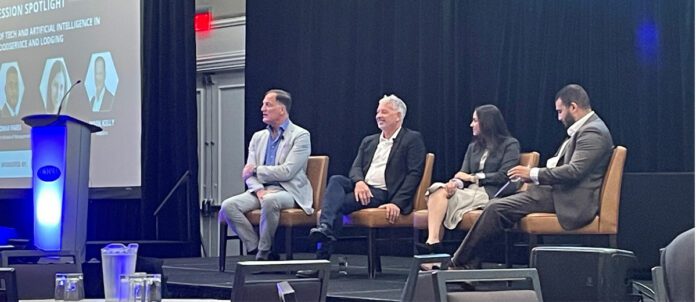By Amy Bostock and Nicole Di Tomasso
TORONTO — The Ontario Restaurant Hotel Motel Association (ORHMA) recently hosted its second annual Ontario Hospitality Conference at the Sheraton Parkway Toronto North Hotel & Suites in Richmond Hill, Ont.
During one of the sessions, titled Practical Use of Tech and Artificial intelligence in Foodservice and Lodging, experts weighed in on the cutting-edge applications of technology available to hospitality operators and how understanding how it can enhance guest experiences, streamline operations, and elevate the overall quality of service, planning and cost management in the hospitality industry. Moderated by Omar Fares, a professor at the Ted Roger’s School of Management in Toronto, the panel included Antonio Comparelli from Metaguest.AI, Mark Kelly from Maestro and Shilpa Arora from DoorDash.
The panel also addressed how artificial intelligence (AI) and Chat GPT are gaining relevance in the realms of foodservice and lodging and are important to understand as they development.
“What we’re seeing is guests taking control over their [customer-experience] journey,” said Comparelli. “We need to put technology in front of them that offers solutions for them to enhance their experience and really improve the overall stay — from needing something dealt with within the room, or help in locating a service or an amenity within the hotel property or close proximity to it. That’s what we find really exciting.”
He acknowledged the challenges associated with addressing privacy concerns when it comes to technology, “but we look at the hotel as creating its own profile. We believe that a hotel has its own brain, its own unique identity and by using that identity in combination with the interaction of the guests creates this ability to deliver information and content without infringing on privacy.”
Navigating the Digital Landscape: Mastering Business Promotion and Reputation Management through Online Reviews, explored the evolving landscape of online-review platforms to understand the influence they wield on consumer decisions and learn how to harness their power to enhance your business’ reputation. Moderated by Sara Wilde, VP of Brand & Guest Relations at Ruth’s Chris Steak House, the panel featured Alli Schmoker, senior manager of Hotel Solutions at TripAdvisor; Bonnie Vesterfelt, area manager for Expedia Group Lodging Partner Services; and Vanessa Henderson, Enterprise Restaurant Relations Manager for Canada at OpenTable.
Wilde kicked off the session with a finding from a research study conducted by Expedia Group. She said approximately 73 per cent of travellers indicated that reviews play a role in their decision-making process, reading nine reviews per property.
“As a traveller, I don’t book a hotel room, vacation rental, car rental or a dining reservation without looking at a review,” said Vesterfelt. “Reviews allow hoteliers and restaurateurs to get a sense of what travellers are really thinking and experiencing. It helps in your sort algorithm, and the higher you are in the sort, the more apt you are to get business.”
Schmoker went on to say that customers prefer long-form reviews. “At TripAdvisor, 100 per cent of reviews are long form, with 82 per cent of customers finding more value in long-form reviews for hotels versus 70 per cent for restaurants,” she said. “Also, 68 per cent of customers are more likely to book after reading a long-form review.”
Then, Henderson talked about ways to encourage customers to leave reviews. “Your responsiveness as an operator is actually the invitation for the next person to leave a review,” she said. “If I see an operator is responding to reviews both positive and negative, I know my feedback is going to be welcomed and honoured at that hotel or restaurant regardless of the experience I have.”
When it comes to dealing with bad reviews, Vesterfelt stressed the importance of responding. “People are nervous about how to respond to a negative review, but it’s the same process as responding to a positive one,” she said. “Acknowledge them by name, be apologetic and empathetic and outline whatever policies and procedures you put in play. Don’t use a defensive tone because you’re not just engaging with that one traveller or diner, you’re engaging with every other potential traveller or diner that could read that.”
Other key topics in this session included managing online review platforms, detecting fraud, analyzing online feedback and reputation management tools and technologies.
Shortly after, a session entitled Hospitality Leadership: Resiliency and Momentum in Uncertain Times, covered the proven patterns that top-performing leaders are focusing on to avoid burnout, how to create clarity and focus in the direction of their goals and how to use culture to drive attraction and retention of both employees and guests. Moderated by Matt Rolfe, founder of Results Hospitality and Westshore Hospitality, the panel featured David Bird, president & CEO, Verve Senior Living and previously senior VP, Operations, Delta Hotels; Jane Yrenaya, Learning Implementation Strategist, FranklinCovey; and Dan Morrow, senior VP of Food and Beverage, Maple Leaf Sports & Entertainment (MLSE).
The panellists began by addressing the evolving needs of the workforce over the last few years and how it’s challenged leaders to adapt.
“When you look at the current workplace, there’s blurred lines between when work starts and when personal life starts,” said Yrenaya. “We’re shifting towards humanity, so when you hire someone, you’re hiring the whole person. It’s not just about the talents they bring to a role, it’s about their body, mind, heart and spirit. That’s challenging leaders to lead their teams differently because interpersonal skills are heightened and burnout and health and wellbeing are top of mind. It’s challenging the industry to upskill in those areas, such as communication, empathy and so on.”
The conversation shifted to leading and responding to the needs of different generations in a workforce operation.
“Most of the leaders are Gen X and Gen Y [because] they make up roughly 80 per cent of the workforce, but I’ve got four generations that report to me,” said Morrow. “The Boomer generation is closer to retirement than they are to anything else. They love face-to-face communication. I love sending an email to a Boomer because within minutes I get a phone call or they’re in my office. If I’m dealing with a Gen X, it’s an email. If I’m dealing with a Gen Y, it’s a WhatsApp or a text. It’s short and sweet communication to Gen X and Gen Y, while Boomers require a lot more explanation, so it’s a really interesting workplace to be in.”
In terms of attracting and retaining leaders to meet the needs of business growth in the senior-living segment, Bird said, “Eighty-five per cent of our residents don’t require serious care, so we have a hotel/restaurant model in terms of hospitality. We try to hire people that are empathetic at their core and care about serving seniors because we can teach them the hard skills, such as reading a schedule or financial statements, but we can’t teach them how to be empathetic.”
The discussion concluded with the panellists describing what culture means to them.
“Culture is what you accept in terms of behaviour within your organization,” said Yrenaya. “It’s important to be intentional about the culture you want to build. If you’re not intentional, culture becomes the tolerance of your worst behaviour. Spend time learning what that means. To attract the best talent, that’s the number-1 reason people will come to your organizations. Is it a culture that values learning and development? Is it a culture of recognition? Is it a culture where we grow as a team versus against each other? It’s all about intentionality but first you have to be able to define what that means for your brand.”
Click here for additional coverage of the Ontario Hospitality Conference.


















